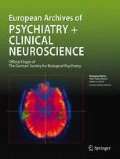Abstract
In June 2001, the then president of the Max Planck Society addressed a formal apology to survivors of Nazi medical crimes. Starting from this ritual of repentance, the paper examines the participants’ diverse views of how to deal with the medical crimes of National Socialism. In comparison with the DGPPN, it asks about possibilities of going beyond historical retrospection to fulfil the imperative of remembrance.
Similar content being viewed by others
References
A first longer version with more detailed references is published in German: Sachse C (2011) Was bedeutet “Entschuldigung”? Die Überlebenden der medizinischen NS-Verbrechen und die Max-Planck-Gesellschaft. In: Berichte zur Wissenschaftsgeschichte 34, DOI: 10.1002/bewi.201101525 (Mar 18). Copyright Wiley-VCH Verlag GmbH + Co. KGaA. Reproduced with permission.
Lübbe H (2001) Ich entschuldige mich. Das neue politische Bußritual, Siedler, Berlin
Sachse C (ed) (2003) Die Verbindung nach Auschwitz. Biowissenschaften und Menschenversuche an Kaiser-Wilhelm-Instituten, Wallstein, Göttingen
Markl H (2003) Die ehrlichste Art der Entschuldigung ist die Offenlegung der Schuld. In: Sachse (ed) Verbindung, pp 41–51
Laks J (2003) Erinnerung gegen das Vergessen. In: Sachse (ed) Verbindung, pp 52–58
Kor EM (2003) Heilung von Auschwitz und Mengeles Experimenten. In: Sachse (ed) Verbindung, pp 59–70
Feldman GD (2003) Historische Vergangenheitsbearbeitung. Wirtschaft und Wisenschaft im Vergleich, Ergebnisse 13. Forschungsprogramms, Geschichte der Kaiser-Wilhelm-Gesellschaft im Nationalsozialismus, Berlin
Markl H (2002) Freiheit, Verantwortung, Menschenwürde: Warum Lebenswissenschaften mehr sind als Biologie. In: Markl H Schöner neuer Mensch? München/Zürich, pp 39–60
Meier C (2010) Das Gebot zu vergessen und die Unabweisbarkeit des Erinnern Vom öffentlichen Umgang mit schlimmer Vergangenheit, Berlin
Kriegel, V (2003) …endlich den höchsten Berg gefunden. In: Sachse (ed) Verbindung, pp 76–77
Max Planck Research (2005) No. 2
Gruss P, Rürup R (ed) Denkorte. Max-Planck-Gesellschaft und Kaiser-Wilhelm-Gesellschaft. Brüche und Kontinuitäten 1911–2011. Sandstein, Dresden, pp 164–173
Conflict of interest
The Author declares that she has no conflict of interest.
This supplement was not sponsored by outside commercial interests. It was funded by the German Association for Psychiatry and Psychotherapy (DGPPN).
Author information
Authors and Affiliations
Corresponding author
Rights and permissions
About this article
Cite this article
Sachse, C. Apology, responsibility, memory. Coming to terms with Nazi medical crimes: the example of the Max Planck Society. Eur Arch Psychiatry Clin Neurosci 261 (Suppl 2), 202 (2011). https://doi.org/10.1007/s00406-011-0241-3
Received:
Accepted:
Published:
DOI: https://doi.org/10.1007/s00406-011-0241-3



